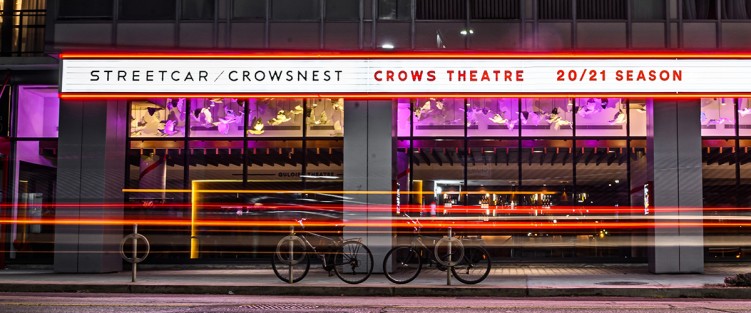 On February 22, in response to the continuing uncertainty about when the Ontario government would ease the COVID-19 lockdown protocols disproportionately affecting the live performing arts, the Toronto Alliance for the Performing Arts (TAPA), which represents 164 professional theatre, dance and opera companies, sent Lisa MacLeod, Minister of Heritage, Sport, Tourism and Culture Industries “an urgent plea requesting regulatory fairness with the television and film industry.”
On February 22, in response to the continuing uncertainty about when the Ontario government would ease the COVID-19 lockdown protocols disproportionately affecting the live performing arts, the Toronto Alliance for the Performing Arts (TAPA), which represents 164 professional theatre, dance and opera companies, sent Lisa MacLeod, Minister of Heritage, Sport, Tourism and Culture Industries “an urgent plea requesting regulatory fairness with the television and film industry.”
The letter continues: “Restrictions preventing professional theatre, dance and opera companies from doing the same [as TV and film companies] threaten the survivability of our sector. We are planning to return to engaging our communities in our theatre venues when it is safe to do so. In the meantime the creation of digital content has become the only form of artistic practice for the professional theatre, dance and opera industry in Toronto, and our members have found new and creative ways to continue to operate and connect with our audiences.”
Meanwhile, even though many TAPA member companies have temporarily shifted to hybrid theatre, dance and opera models that include livestreaming, pre-recorded film and digitization, “entertainment concert venues, theatres and cinemas (includes drive-in or drive-through events) [are] closed for all purposes, including rehearsing or performing a recorded or broadcasted event, artistic event, theatrical performance or other performance.” However, the letter points out, the Businesses Permitted to Open and Sector Specific Restrictions (14) have allowed film and television to continue to operate: commercial film and television production, including all supporting activities such as hair, makeup and wardrobe.”
Granted, there are conditions and restrictions, and the TAPA letter enumerates these: no studio audiences permitted to be on the film or television set; no more than ten performers permitted on the film or television set; the set configured and operated in such a way as to enable persons on the set to maintain a physical distance of at least two metres from other persons except where necessary for filming; persons providing hair or makeup services must wear appropriate personal protective equipment; and singers and players of brass or wind instruments must be separated from any other performers by plexiglass or some other impermeable barrier.
It’s a list familiar to many sectors of the economy. None of these items, however, prompted performing arts sector pushback as reflected in the TAPA letter. So what did? The following sentence: “The film or television set may be located in any business or place, including any business or place that is otherwise required to be closed.”
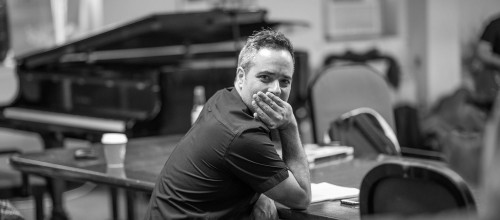 On February 24, J. Kelly Nestruck, The Globe and Mail’s theatre critic, underscored “how infuriatingly illogical the continuing situation is,” in a quote by Chris Abraham, artistic director of Toronto’s Crow’s Theatre, which captured the unfairness and apparent arbitrariness of the situation: “A film company can come and rent our theatre and shoot a film in it – and we can’t do that ourselves,” said Abraham.
On February 24, J. Kelly Nestruck, The Globe and Mail’s theatre critic, underscored “how infuriatingly illogical the continuing situation is,” in a quote by Chris Abraham, artistic director of Toronto’s Crow’s Theatre, which captured the unfairness and apparent arbitrariness of the situation: “A film company can come and rent our theatre and shoot a film in it – and we can’t do that ourselves,” said Abraham.
The Globe and Mail published two letters to the editor in response to Nestruck’s story. A Toronto reader wrote: “Perhaps the quickest solution to this lack of logic would be for theatre companies to redefine themselves as film companies. It is, by definition, their current activity.”
The second letter came from Karel Martin Ludvik, a Canadian operatic soloist living in Essen, Germany. “It is crucial that we all do our part to reduce the spread of COVID-19,” Ludvik wrote. “However, not allowing theatres to film or stream their work gravely endangers the fate of artistic institutions that are vital to our communities.” Last fall, Ludvik appeared in two productions at the Bavarian State Opera. One was performed in front of an audience; the second was reduced to a livestream because of COVID-19. “We took the exact same precautions in both productions (frequent testing etc.),” he wrote. “No one became ill. He added: “Although singing for a live audience is more pleasurable, the livestream nonetheless allowed the art to be brought to the audience.”
Twists and Turns
Since the TAPA letter and the Nestruck article, the situation has taken a couple of twists and turns. On March 2, 2021, TAPA executive director Jacoba Knaapen replied to a question from me: “FYI, to date, ZERO reply from the Province.” And then, on March 8, the current lockdown was lifted, with Toronto and Peel moving out of limbo into the incongruously named “Grey Zone”. It is better than it sounds, though. TAPA member companies (and other presenter/performers) can, for now, return to the business of creating digital content, rehearsing and broadcasting, subject to conditions similar to those imposed on film and TV companies: no audiences allowed; rehearsing, recording or broadcasting an event or performance permitted (for example, streaming a performance to an online audience); two metre distancing except when essential for the performance; and a barrier between both singers and wind/brass players and all other performers.
It’s good news, as far as it goes, but does nothing to address the inequity which prompted the February 22 TAPA letter. Simply put, without a change to Sector Specific regulation itself, if we go into lockdown again, the temporarily levelled playing field reverts to the regulatory unfairness challenged by TAPA and others.
All of this prompted me to follow up, as I did in the February/March issue, with a range of performing arts presenters, to get their current thinking (cautiously optimistic, for the most part) on this thorny question.
Toronto Symphony Orchestra
Matthew Loden, CEO of the TSO, issued the following statement in response to my questions:
“The TSO has been in close contact with our colleagues in government and conveyed our commitment to rigorous adherence to safety protocols and our desire to continue to record our concerts. We have also been part of a collaborative effort with other arts organizations in expressing our desire to safely continue. While we are disappointed to not be able to record during periods of lockdown and stay-at-home orders, we appreciate the difficult decisions our public health units have had to make to keep our city and province safe. We are grateful that the issue was brought to Public Health Ontario for consideration and will always accept the direction of scientists and medical experts about how to keep our orchestra, staff, patrons and community safe. Once the city goes back to the pandemic framework we will resume our recordings, sharing our music with our patrons and our city.”
RCM
The Royal Conservatory continues to do everything possible to reschedule upcoming concerts to new dates and, in the meantime, bring music online. “Despite the ever-changing pandemic chaos, including regulations from the province, the music is not stopping,” said Mervon Mehta, executive director of performing arts at RCM. “Artists are eager to play for you and we are thrilled to ... invite you to stream a dozen more concerts from our original season schedule.”
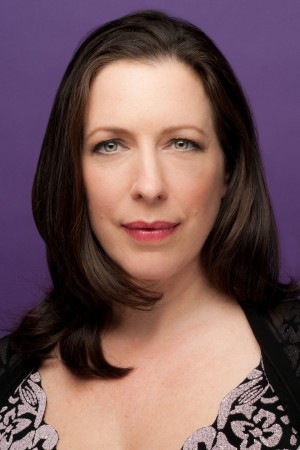 Included among the free online concerts over the next several weeks are two by the ARC Ensemble. The first, on March 12, at 8pm, is a rescheduled item from RCM’s Beethoven 250 Festival: Beethoven’s Piano Trio in D Major, the composer’s own arrangement of his Symphony No.2 Op.36, and a selection of folk songs for voice and piano trio with Monica Whicher, soprano. On April 11 at 1pm, the Ensemble will play music by two little-known Jewish composers: the Sephardic works of Alberto Hemsi (1898-1975) and the elegant classical compositions of Vittorio Rieti (1898-1994). The ever-popular Glenn Gould School Piano Showcase, another free online concert, is available May 7 at 7:30pm, with GGS students displaying their talents in a French program that includes Debussy’s Preludes Book I and various works for two pianos and piano four hands.
Included among the free online concerts over the next several weeks are two by the ARC Ensemble. The first, on March 12, at 8pm, is a rescheduled item from RCM’s Beethoven 250 Festival: Beethoven’s Piano Trio in D Major, the composer’s own arrangement of his Symphony No.2 Op.36, and a selection of folk songs for voice and piano trio with Monica Whicher, soprano. On April 11 at 1pm, the Ensemble will play music by two little-known Jewish composers: the Sephardic works of Alberto Hemsi (1898-1975) and the elegant classical compositions of Vittorio Rieti (1898-1994). The ever-popular Glenn Gould School Piano Showcase, another free online concert, is available May 7 at 7:30pm, with GGS students displaying their talents in a French program that includes Debussy’s Preludes Book I and various works for two pianos and piano four hands.
INNERchamber
In a story in our February/March issue, Wendalyn Bartley noted that INNERchamber’s Lost and Found concert on February 7 – which was to have been livestreamed from Revival House, the Stratford ensemble’s usual restaurant partner – had been forced by the new protocols to move to Canterbury Music Company studios in Toronto. I contacted INNERchamber’s artistic director, violinist Andrew Chung, to ask what the change in venues was like.
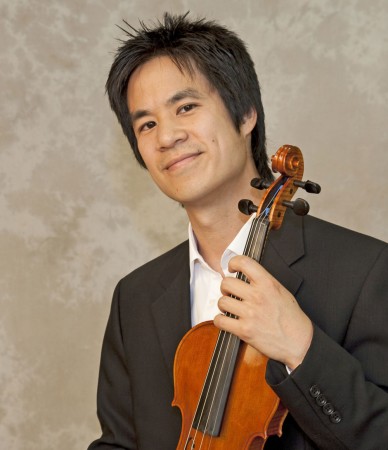 “The concert was a different experience for us as our concerts have never been presented from a recording studio,” he said. This season, he explained, was already quite an adjustment: “We have [only] been permitted a small in-person audience in Stratford, and we simply have to imagine the collective attention of our other followers watching from home. For Lost and Found we were, additionally, physically two hours away, even though takeaway meals were being served back in Stratford through our restaurant partner, Revival House!”
“The concert was a different experience for us as our concerts have never been presented from a recording studio,” he said. This season, he explained, was already quite an adjustment: “We have [only] been permitted a small in-person audience in Stratford, and we simply have to imagine the collective attention of our other followers watching from home. For Lost and Found we were, additionally, physically two hours away, even though takeaway meals were being served back in Stratford through our restaurant partner, Revival House!”
He has no complaints about Canterbury, though: “We had a great experience – Jeremy Darby at CMC studios is really a fantastic guy to work with and a talented sound engineer. Our videographer, Mike Fisher, also lives in Stratford but does a lot of work at CMC studios. From the technical angle, everything was covered really well and we really enjoyed performing. With a lot less performing work taking place these days, every opportunity seemingly takes on so much more meaning.”
Significantly, Chung explained that the protocols the ensemble had been using at Revival House were basically the same as those in CMC studios. “We physically distance ourselves two metres apart and we use pop-up, banner-style clear plastic barrier screens between wind players and singers,” he said. “CMC studios had excellent health and safety protocols and cleaning procedures in place that put us at ease.”
Since then, Stratford has returned to the Orange Zone within the Response Framework, enabling INNERchamber to return to Revival House for performances on March 21 and April 18. “Again, a small in-person audience is permitted,” Chung said, “and livestreaming continues for those enjoying at home. Revival House serves meals to those in person, while keeping the takeaway option available for home viewers.”
Arraymusic
A story in our September 2020 issue, by Andrew Timar, described how The Array Space (which had been transformed into a livestreaming venue before the pandemic) was at that point ahead of the curve in adapting to COVID protocols. I asked Sandra Bell, Arraymusic executive director, how they were holding up during this latest lockdown. She told me that they were closed for any activity that involves a live audience and that they’re incurring additional expenses for cleaning and PPE. “We are grateful for the support of the provincial and federal governments’ rent and wage subsidies,” she added “and for our landlord’s support. This has allowed us to have staff on payroll and to begin to operate our space. We’re also grateful for the Canada Council, Ontario Arts Foundation and Ontario government for additional funding. We will continue to program, record and stream productions with a very limited number of performers and strict safety protocols, as others are doing. So stay tuned for our upcoming announcement of new programming.”
Music Toronto
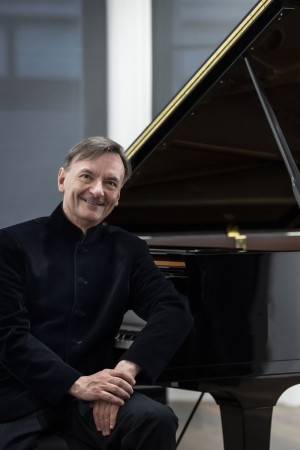 Redoubtable British pianist Stephen Hough had been slated to appear on Music Toronto’s stage this past January 19, 2021. Instead, he will perform on November 9 – one of five recitals in a formidable piano lineup that also features David Jalbert, Marc-André Hamelin, Benjamin Grosvenor and Vanessa Benelli Mosell for Music Toronto’s 2021/2022 season.
Redoubtable British pianist Stephen Hough had been slated to appear on Music Toronto’s stage this past January 19, 2021. Instead, he will perform on November 9 – one of five recitals in a formidable piano lineup that also features David Jalbert, Marc-André Hamelin, Benjamin Grosvenor and Vanessa Benelli Mosell for Music Toronto’s 2021/2022 season.
In an online conversation in early March on Musical America’s One to One with the magazine’s features editor, Clive Paget, Hough spoke eloquently about the value of the arts in our lives:
“If you look back to a year ago when this whole pandemic began, imagine that year without the arts, without movies on the television, TV of course, without concerts, without interaction, without listening to music – we would all be absolutely mad,” he said. “Yes, we need our economy and all that side of life, but without the arts you wonder why we are on the planet at all.
“What’s the point of living unless we have that nourishment, and whatever religious side (or not) you see to this, it’s an ecstasy, it’s contemplation, it’s transcendence. And I think we need to get that into the bloodstream of politics, too, so that our politicians say, ‘You know, we need to put money into the arts because the arts give us back more than we could ever give it.’”
Paul Ennis is the managing editor of The WholeNote.



